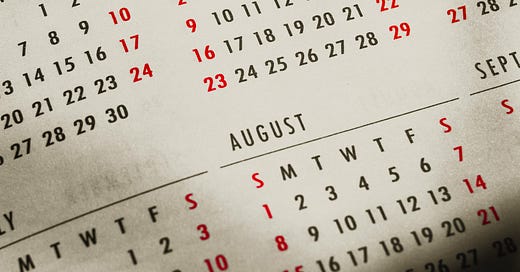Ten Thousand Days
I only knew my comadre and compadre were good friends of my parents from church, but our paths crossed during the 2006 march for immigrant rights from Chicago to Batavia. We saw each other, walked together, and cried out, “¡Sí se puede!”
We did so all the way to Dennis Hastert's Illinois office, the then-Speaker of the House. As is painfully obvious, we didn’t change his mind or any laws, but we affirmed our dignity and the dignity of all undocumented people. My compadre was moved that I walked with them because I am a U.S. citizen, a status given to me when my parents became citizens. Soon after, he asked me to be padrino or godfather to his youngest son. I was surprised but accepted.
And I began to understand why my mom loved them so much—the selfless hospitality, their simple ways, the love of preparing and sharing food—obvious signs of small-town Mexico. I ate about a dozen of my comadre’s huge tamales one Christmas Eve a few years ago. It’s a testament to her culinary skills, not my greed.
I also saw the wisdom that can come from a hard life well lived. Being undocumented is difficult, but I never heard them complain. They allowed the pain (the loss of a job, no food, restricted travel, no health insurance, and an uncertain future, among other issues) to wash over them like strong waves. They got knocked down, for sure, but got up, prayed, learned, and continued living. That’s who they are. That’s their faith.
About three months ago, after years and thousands of dollars lost in legal wrangling, they finally got their green cards. The first thought, the one my comadre had carried in her heart for years, was to return home.
“How long has it been, Comadre?” I asked.
There was a pause with a twinge of pain.
“Twenty-nine years,” she said.
I paused and then did the math. It’s about 10,0001 days.
Birthdays, funerals, communion days, Christmas, weddings, confirmations, New Year’s Days, and day-to-day life are gone, lived out thousands of miles away from beloved family. Yet, their connection to them and the land was still as real as when they left, like that of a deeply rooted tree. Some connections were blown away, like leaves, by time and death. Others are just bare branches, but now they can repair and strengthen those weak spots and fertilize the roots.
I learned as much from my own family. When I was a boy, and we would return to Michoacán, some relatives would comment that we hadn’t forgotten where our umbilical cords were buried. They saw my parent's effort to keep us grounded, connected, and living our faith. Some native peoples of Mexico continue the custom of burying the umbilical cord after it dries when a baby is born. Depending on the tradition, it is buried in the home kitchen, the garden, or the fields as a way of connecting the person to that place, time, history, and memories, and with the hope that the child will return. I see the act as a symbol of taking traditions and passing them on.
I don’t know if my compadres followed that custom, but after seeing their joy, it’s evident that their homeland still nourishes them, and it will now do the same for their children.
Twenty-nine years is 10,592.2 days, actually, but 10,000 makes a better title.





